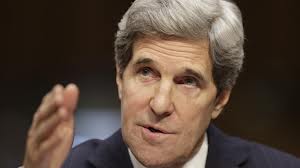 U.S. Secretary of State John Kerry said Egypt’s army had not seized power after toppling President Mohamed Mursi, as Islamists summoned their followers to resume protests and defy orders to disperse.
U.S. Secretary of State John Kerry said Egypt’s army had not seized power after toppling President Mohamed Mursi, as Islamists summoned their followers to resume protests and defy orders to disperse.
The Egyptian army “was asked to intervene by millions and millions of people,” Kerry told Pakistan’s Geo TV yesterday, according to a State Department transcript. The military “did not take over,” he said, and “in effect they were restoring democracy.” Kerry also criticized the shooting of pro-Mursi demonstrators by security forces, saying the U.S. was “very, very concerned.”
He later said in London that “all of the parties involved have a responsibility to be inclusive, to work toward a peaceful resolution” and the “last thing we want is more violence.” Deputy Secretary of State Bill Burns will begin a visit to Cairo today, the State Department said in statement.
Brotherhood supporters massed in Cairo and other cities after Friday prayers again today to demand Mursi’s reinstatement following his removal by the army on July 3, television pictures showed. “Down with the commander of the armed forces, Mursi is our president,” they chanted as they waved national flags.
Calls by Mursi’s Muslim Brotherhood and its supporters to join rallies today have fueled fears of further violence, after dozens of Islamists were killed last weekend. The Interior Ministry yesterday signaled a police crackdown against pro-Mursi sit-ins in two of the capital’s main squares, promising safe conduct to those who left now.
Media Protest
Security forces fired tear gas at protesters in Cairo’s media city, where several pro-Mursi television channels have been shut down, Al Jazeera TV reported. The demonstrators had been trying to break through gates, Al Jazeera said, citing the Interior Ministry.
The overthrow of Mursi, Egypt’s first freely elected civilian leader, has escalated the tensions between Islamists and their opponents that built up during his one-year rule, and extended the political turmoil that has persisted since the fall of Hosni Mubarak in February 2011.
Since July 3, authorities have been rounding up Islamist leaders and freezing their assets. The Brotherhood’s top official, Mohammed Badie, was charged with incitement to murder this week. The group’s supporters have remained on the streets and scores have been killed in clashes with police.
‘Brothers’ Blood
Mohamed Hassan, an influential preacher in Islam’s Salafi movement, urged Egyptians to take part in today’s rallies, dubbed by their organizers “Egypt Against the Coup.”
“Don’t leave your brothers in the squares to be slaughtered,” he said in a broadcast on Al Jazeera yesterday. “The blood of our sons will become a curse on those who spill it.”
Thousands of Mursi supporters gathered in squares in Nahda and Rabaa Al-Adawiya in Cairo, where the Brotherhood released birds into the air, saying it wanted to illustrate the protests were peaceful.
The Interior Ministry appealed to demonstrators to “resort to reason, prioritize the interests of the homeland, heed the public interest and swiftly leave for everyone’s safety.”
Egypt’s army-backed government accuses the Brotherhood of inciting violence to portray itself as a victim.
The U.S. has had close ties to Egypt’s army for three decades, and gives it about $1.3 billion in aid each year. The administration has declined to label Mursi’s ouster a coup, which by U.S. law would require the aid to be cut.
Bloomberg

Leave a Reply
You must be logged in to post a comment.